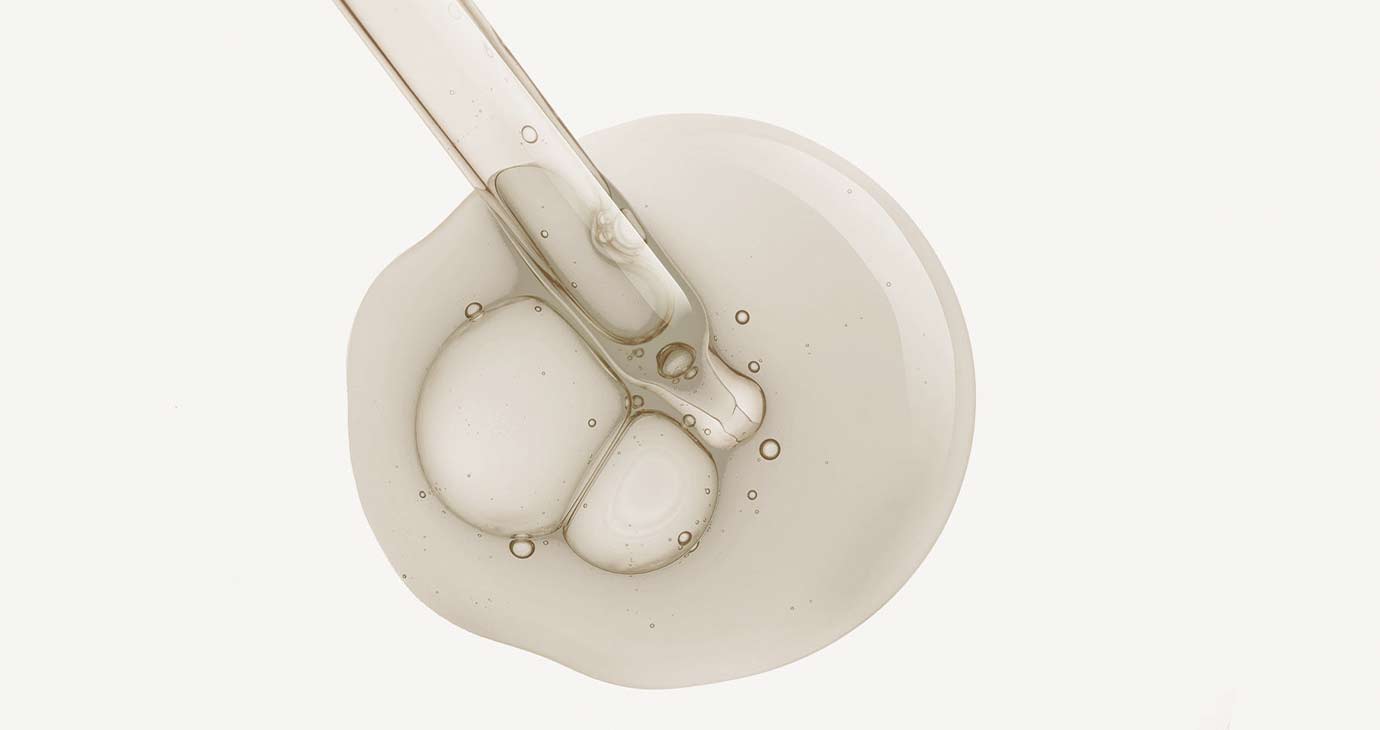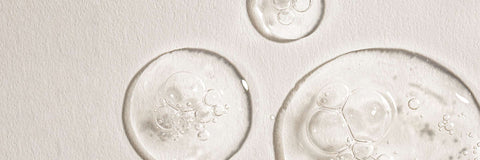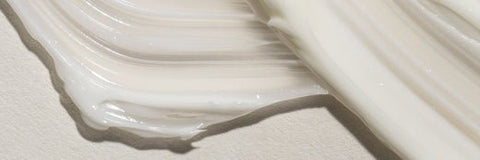If you aren’t familiar with this skincare super ingredient yet, don't let the name put you off— hyaluronic acid is perfectly natural and extremely beneficial for the skin. Its specialty is hydrating the heck out of your skin, but it does so much more.
Read on to find out what exactly hyaluronic acid is, ten benefits of hyaluronic acid for skin, how to use it, what types of skin it works for, and answers to all your other key questions.
IN A NUTSHELL
Ingredient Category: Humectant
Main Benefit: Hyaluronic acid can hold up to 1,000 times its weight in water, making it an ultra-hydrating ingredient that is great for all skin types.
Find It In: Just Dew It Hydrating Serum, Nectar of the C Vitamin C Serum, Eyes Eyes Baby Anti-Aging Eye Cream, H2 Oh Yeah Hydrating Moisturizer, and Crème de la Cream Brightening Moisturizer.
What Is Hyaluronic Acid?
Hyaluronic acid is a type of sugar molecule naturally found in our bodies, from our skin and hair, to our joints and eyes. It helps keep things lubricated and cushioned thanks to its impressive ability to retain moisture. Seriously, hyaluronic acid (also known as HA) can hold up to 1,000 times its weight in water! It's that good.
If we already have it in our bodies, then why do we need to put it on our faces? Tragically, a substantial portion of the hyaluronic acid we produce degrades quickly. We also create less as we age. To get more of the good stuff, people get injections, take oral supplements, or– most commonly– use topical products infused with hyaluronic acid, such as as a serum or moisturizer.
Wondering where we get the HA used in these products? Until recently, it was derived from rooster comb; but thankfully, scientists have worked out other ways to isolate it since. That includes synthetic and natural processes, like microbial fermentation, which is currently one of the most common ways to source hyaluronic acid. Always check labels or manufacturer websites to ensure the product you're eyeing is vegan.
10 Hyaluronic Acid Benefits
How can hyaluronic acid enhance your beauty regimen? Here are just 10 of the many benefits you can reap when employing hyaluronic acid for face and skincare:
1. Hyaluronic acid functions as a humectant.
One of its greatest strengths, hyaluronic acid draws water to the surface of your skin to keep it nice and hydrated, resulting in a firmer-looking appearance.
2. It contributes to a dewy look.
This extra hydration gives your face a fresh, dewy glow. Hyaluronic acid is so effective at pulling water to the top layer of the epidermis, you don't need much to see results.
3. It has a soothing effect.
When used in the right concentrations and conditions, hyaluronic acid is like a drink of water on a hot day — parched skin will feel soothed and comforted.
4. It helps skin stay resilient and flexible.
One of the effects of having ultra-hydrated skin with high water content means it bends and flexes more easily, with reinforced resilience.
5. It absorbs quickly.
Hyaluronic acid is formulated to have precise molecular dimensions that make it penetrate the skin quickly and deeply.
6. It promotes an ageless appearance.
Well-hydrated skin tends to feel and look firmer and plumper, in turn smoothing the skin and giving it a youthful look.
7. It reduces the appearance of fine lines and wrinkles.
Another great aspect of hydrated, reinforced skin? It diminishes the appearance of fine lines and wrinkles.
8. It doesn't react negatively with many ingredients.
Hyaluronic acid works well with most other ingredients and complements vitamins, other acids, retinol, and peels. But look out for low-pH acids like glycolic acid, which can potentially make hyaluronic acid less effective.
9. It's great for anyone dealing with sudden skin dehydration.
Whether the season is changing, you've spent a little too much time outside, or you can't resist extra hot showers, hyaluronic acid will help get you back to glowing in no time.
10. Hyaluronic acid is a safe option as a filler.
Gone are the days when Botox was the only choice for those looking to use dermal fillers. Since our bodies already produce hyaluronic acid, it's a popular temporary alternative that doesn't customarily cause major irritation.

How to Use Hyaluronic Acid for Skin
In general, the standard concentration level of HA is 2% or lower, as any higher can have drying effects or irritate the skin. For this reason, hyaluronic acid isn't DIY friendly. Instead, it's best used in specially formulated serums, masks, creams, spot treatments, and moisturizers.
There are a few science-y things the pros (read: cosmetic chemists) do to make sure hyaluronic acid is as effective as possible. That means hyaluronic acid can show up on labels under names like hydrolyzed hyaluronic acid, sodium acetylated hyaluronate, or sodium hyaluronate.
Hyaluronic acid is best used with a moisture-packed formula and is most effective when you don't overdo it. Depending on the concentration of HA in your serum or moisturizer, one hyaluronic acid enhanced step in your routine can be enough. Some hydrating serums are meant to work in tandem with a hydrating moisturizer to give you the best results, as moisturizers include occlusive ingredients to seal all the goodness in.
Perhaps the most important rule of all: apply it to damp skin. This moisture magnet does its best work when it has a reserve of water to pull from.
Here's a time-tested daily regimen to follow:
1. Start with a cleanser. (Optional exfoliators or masks can be applied right after).
2. Apply a toner or facial mist; a hydrating rose water toner is a great option.
3. Use a serum. This is one of the most popular steps for introducing hyaluronic acid. We’ve infused both our Just Dew It hydrating serum and our Nectar of the C vitamin C serum with HA for the perfect glow.
4. Seal it in with a moisturizer, or introduce hyaluronic acid in moisturizer form (applied to wet skin, of course!); we’ve included HA in both H2 Oh Yeah and Crème de la Cream.
5. Apply an eye cream. Our Eyes Eyes Baby treats the delicate skin around your eyes with – you guessed it – hyaluronic acid.
6. Sunscreen time! (Skip this step at night, obvs).
What Skin Type Is Hyaluronic Acid Good For?
Because hyaluronic acid is a grade-A overachiever, it's generally great for all skin types. But that doesn't mean it can't benefit a few in particular, such as:
Dry Skin: This is a no-brainer! However, it all depends on what the underlying cause of your dryness is. If you're dealing with skin that can't stay hydrated due to external stressors, hyaluronic acid will be your best friend. Keep in mind that you need to seal it in with a moisturizer or face oil! And keep the concentration under 2%.
Oily/Combination Skin: Those with oily or combination skin types can reap the rewards of hyaluronic acid products, too. Although your skin may be oil-rich, it can still lack the proper amount of water needed, causing it to be dehydrated at times. The water HA brings to the surface of the skin takes the place of some of the oil that would otherwise hang out there. The result? It helps hydrate without any extra greasiness.
Tired/Aging Skin: Environmental stressors got your skin down? Hyaluronic acid is a smart choice for creating a tighter, firmer look with a bit of bounce.
Frequently Asked Questions About Hyaluronic Acid
What is hyaluronic acid?
Hyaluronic acid (HA) is a naturally-occurring molecule our bodies produce for lubrication and hydration. It has impressive moisture-binding capabilities and is extremely beneficial in skincare.
What are the benefits of hyaluronic acid?
For skin, hyaluronic acid shines brightest as a hydrator. It can also soothe skin, create a dewy appearance, have a plumping effect, function as a humectant, and rejuvenate tired skin.
How do you use hyaluronic acid?
It’s best to look for it in skin care products like serums, moisturizers, or creams. Always apply it to damp skin so it can work the most magic.
What skin type is it best for?
Hyaluronic acid is a friend to all skin types but is most beneficial for dry and dehydrated skin.
Is hyaluronic acid safe?
Yes! But less is more. Hyaluronic acid concentrations should stay at 2% or less, and you shouldn't include it in every skincare product you use. Those with certain skin conditions should patch test hyaluronic acid or consult a dermatologist.
Can I use hyaluronic acid every day?
Definitely. The average human body synthesizes about a third of its natural hyaluronic acid every day and generates less as it ages. As long as you have no adverse reactions, using hyaluronic acid consistently can result in smoother, more hydrated skin.
What does it pair best with?
Hyaluronic acid is excellent at carrying moisture to the skin but could use a hand in keeping it there. Ingredients that enhance retention are key. Look for things like castor oil, shea butter, jojoba oil, cocoa butter, and more.
Does hyaluronic acid have side effects?
Hyaluronic acid tends not to induce allergic reactions since our bodies are already so familiar with it. But if used too often or in dry conditions, it can drain water from the skin and allow it to evaporate. Certain forms of hyaluronic acid can also penetrate very deeply into the skin, pulling other ingredients with it. So make sure what you're using is clean and free of nasties like phthalates, dyes, fake fragrances, silicones, and others.
Can you use hyaluronic acid for lips?
Lips need love, too! Just as hyaluronic acid is great for moisturizing the skin, the lips are no different. They're just protected by skin that happens to be more delicate. There are plenty of hyaluronic acid enhanced lip balms and glosses out there to provide your pout with the drink of water it needs. It can also give the appearance of fuller, plumper lips, making it a perfect addition to lip boosters. Some even use hyaluronic acid fillers for lip injections.
To sum things up — hyaluronic acid is basically taking over the beauty world, and your skin will benefit from it!











